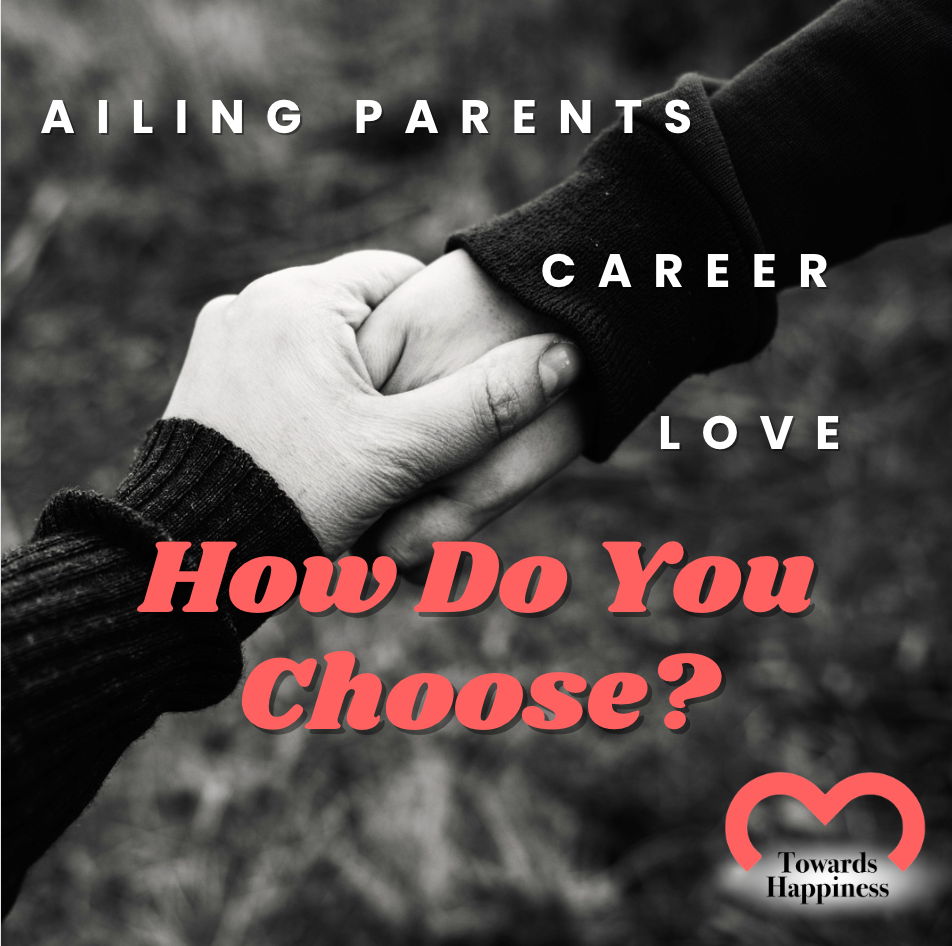Duty: When Obligation Blocks Our Shot at Happiness.
- Ahron Friedberg M.D.
- Dec 25, 2023
- 5 min read
Updated: Dec 28, 2023
Obligations - No One Owes Anyone Their Life.
Ahron Friedberg M.D.'s blog first appeared in Psychology Today. Link to blog here.
Corinne, a New York economist, grapples with a dilemma as her aging mother in England needs care. Torn between her life abroad and a budding relationship with Carl, she struggles with sacrificing her career and love for her mother.
My patient Corinne was British, a graduate of the University of Cambridge. But despite the classy credentials, she was struggling to see herself as forward-looking, capable, even exciting.
Caught Between Two Countries.
Corinne’s problems were transnational, a contest between the life that she’d made here and the one back in England. Since graduating from Cambridge in the early 2000s, she had worked in New York as an economist for a large British bank. It meant crunching reams of data but, in addition, traveling to regional exchanges to see how growing companies would likely perform. She met lots of people. Since some of those people also traveled, she’d see them when they came to town. In particular, there was a guy whom she fancied, Carl. The relationship, as she described it, was “hot and heavy, but punctuated.” They saw each other when they could and, lately, had taken vacations together.

Corinne’s problems were transnational, a contest between the life that she’d made here and the one back in England...her mother was 78, lived alone, and was terrified of being moved to an assisted living facility because of encroaching memory issues
But there was a hitch. Corinne had just turned 40, but her mother was 78. She lived alone, south of London, and was terrified of being moved to an assisted living facility because of encroaching memory issues. She wanted Corinne to return to England to care for her and keep her out of the clinic. During the past few months, as her mother’s situation worsened and her pleas became more intense, Corinne had taken time off to see for herself. But it couldn’t go on this way. Something had to give. Either Corinne moved in with her mother, or she stayed in New York and consigned her mother to the clinic. Carl would be history (or nearly).

New York and Love, or London and Ailing Parent?
As we spoke, it became clear that she felt torn. She had grown into her life in New York. Carl had even talked about trying to relocate from Chicago. They weren’t sure he could, but that he even raised the possibility suggested that he might upend his life for her. It was the first time anyone had expressed such feelings, and Corinne teared up when she described them. Ever the realist, of course, she knew that Carl wasn’t proposing marriage. “But who knows?” she said.
There were many factors affecting Corinne’s decisions. There was Carl, of course, and the possibility of a fulfilling relationship. Equally important was the sense she had of herself as a competent woman with a good career and prospects. In fact, I thought that part of what attracted Carl, who was a banker himself, was that Corinne was something of a high-flyer. She suggested that her work made her persona. “If I just went back to being somebody in a house with an aging parent, the aura would be gone.”
Person vs Persona. Why Makes People Love Us?
Corinne had been around the block often enough to know that love is complex. Why do people love us? What makes us beautiful, exciting, and comforting? Apparently, Carl liked strong, competent women. They gave him a buzz. Corinne suggested that apart from the effect of relocation—adding 3000 miles to a long-distance relationship—radically changing her persona would have the effect of radically sinking her appeal. It would certainly sink her self-confidence, her readiness to put herself out there for successful, discriminating men like Carl. She’d be less likely to take emotional risks, which encouraging Carl’s move would certainly be.
“Where would I be without my mother? She inspired me to study, to get into Cambridge—to be who I am.”
But whatever Corinne’s romantic concerns, she felt profoundly obligated to her mother. She loved her, of course, and called every other day or so. But it was more. As Corinne put it, “Where would I be without my mother? She inspired me to study, to get into Cambridge—to be who I am.” In Corinne’s calculus, she owed her mother her life.
My Life vs My Ailing Parents' Life
Was she looking back too fondly? Attributing to her mother what, in fact, was her own drive and ability? I asked her, and she denied it. It wasn’t so much that she cared about her mother, as one would about a parent that one dearly loved; rather, it was a sense of extreme obligation, of gratitude ratcheted up several notches. We spoke about whether any obligation to another meant rebuffing one’s own potential for love and happiness—one’s own potential to feel productive and alive.
So, what to do? It came down to Corinne's life (of which love and meaningful work are a rightful part) versus her mother’s life. I could not tell her what to do. But we talked, for example, about whether her mother was being selfish or, rather, excessively self-involved as her world shrank around her. Corinne said that the possibility had crossed her mind. But in the next breath, she wondered whether, when you owed someone, you owed them the debt in its entirety.
Was Corinne's mother being selfish, or rather excessively self-involved as her world shrank around her?
The Boyfriend.
So, we kept talking. Carl thought his best strategy was to stay out of it. Then one day, Corinne came in and announced “I’ve decided. I can’t take this anymore.” After much thought, she had tried to put herself in her mother’s place. “I would not have asked my daughter to forego her life for mine,” she said. In other words, she’d concluded that no one should ask anyone to owe them their life. It wasn’t a fair trade. It was aggrandizing. According to Corinne, her mother was initially obligated to her, so it wasn’t as if all that careful nurturance was something extraordinary. It came with being a mother. Hence Corinne was living the life that she had every right to live. Hence her mother would go to the facility.
She explained that, in part, she had been motivated by the possibility of making it with Carl. “I thought about whether I love him,” she said, “and I decided that maybe I could. This stuff with my mother was holding me back.”
Making Decisions Based on Emotional Logic
But what really impressed me was Corinne’s ability to base her decision in an emotional logic. She decided what a mother could reasonably expect of a child. Then she applied the answer to herself. She wanted to do the right thing—not just for herself, which might have been inadvertently selfish, but in terms of some abiding principle of parent/child relationships. She wanted to be able to live with her decision, which was only possible (at least, to someone like her) if it were grounded in principle and, thus, likely to be right in some universal sense.
About the Author
Ahron Friedberg, M.D., practices as a psychodynamic psychiatrist in Manhattan. He is a Clinical Professor at Mount Sinai Icahn School of Medicine and Editor of the Academy Forum.









Comments